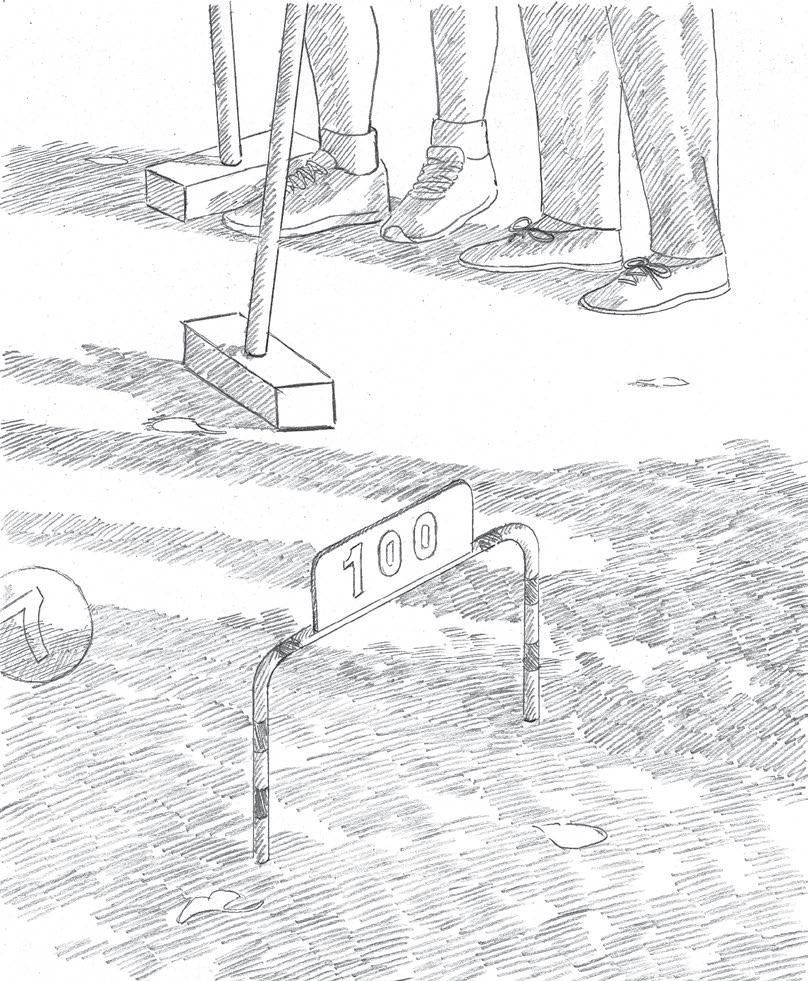

RHEE KUN HOO
Translated by Suphil Lee Park
















Rhee Kun Hoo was born in 1935, during imperial Japan’s occupation of Korea. Rhee worked as a psychiatrist and taught at Ewha Womans University during his fifty-year career, making indispensable contributions in the field of mental health care in South Korea, where he is considered a visionary. He was the first to introduce an open-ward system and psychodrama as a therapy method in psychiatric facilities in the country, and also served as the president of KNPA (Korean Neuropsychiatric Association). After retirement, Rhee and his wife have dedicated themselves to providing post-war Korean generations with guidance in life such as parenting, counseling, relationship advice and postretirement life coaching. Rhee has written over ten books in Korean to date, including his bestselling debut essay collection, I Want to Have Fun Till the Day I Die (Galleon, 2013), which has sold over 800,000 copies in Korea.
Suphil Lee Park (Translator) is a bilingual poet, translator and writer born and raised in South Korea before finding home in the States, where she studied English Literature and Poetry at NYU and the University of Texas at Austin. She wrote the poetry collection, Present Tense Complex, winner of the Marystina Santiestevan Prize (Conduit Books & Ephemera 2021), and a forthcoming poetry chapbook, Still Life, selected by Ilya Kaminsky as the winner of the Tomaž Šalamun Prize. She also won the Indiana Review Fiction Prize and received a fiction prize from Writer’s Digest. Her translations of Korean literature have appeared or are forthcoming in the Cincinnati Review, the Los Angeles Review, and New England Review, among others. Her own work can be found in the Iowa Review, the Kenyon Review, and Poetry, among others. Find more about her at: https://suphillee-park.com/
If You Live to 100, You Might as Well Be Happy
If You Live to 100, You Might as Well Be Happy
LESSONS FOR A LONG AND JOYFUL LIFE
Translated from Korean by Suphil Lee Park
Rider, an imprint of Ebury Publishing 20 Vauxhall Bridge Road
London SW 1V 2SA
Rider is part of the Penguin Random House group of companies whose addresses can be found at global.penguinrandomhouse.com
어차피 살 거라면, 백 살까지 유쾌하게 나이드는 법 by Rhee Kun Hoo copyright © 2019 by 메이븐 (Maven)
English translation copyright © Suphil Lee Park 2024
Rhee Kun Hoo has asserted his right to be identified as the author of this Work in accordance with the Copyright, Designs and Patents Act 1988
First published in Korea by 메이븐 (Maven, Korea) in 2019 This translation first published in Great Britain by Rider in 2024
www.penguin.co.uk
A CIP catalogue record for this book is available from the British Library
Illustrations by Younggeun
Hardback ISBN 9781846047794
Typeset in 11.5/14.5pt Fairfield LT Std by Jouve (UK), Milton Keynes
Printed and bound in Great Britain by Clays Ltd, Elcograf S.p.A.
The authorised representative in the EEA is Penguin Random House Ireland, Morrison Chambers, 32 Nassau Street, Dublin D02 YH68
Penguin Random House is committed to a sustainable future for our business, our readers and our planet. This book is made from Forest Stewardship Council® certified paper.
Part 2: Don’t Leave with Regrets
Part 4: The Upside of Ageing
Part 5: How to Start Your Happily
This year, I turned eighty-seven. Now anyone can take one look at me and tell I’m elderly. When I walk, I take laborious, slow steps, as if time’s on my side; I’m hunched over and my hair is unmistakably white.
Eight years ago, I slipped while walking downstairs and hit my head. Upon falling, I thought that was the end for me. I thankfully recovered after a month of hospitalisation. Still, since then, I’ve felt the always-looming death even closer than before.
Montaigne wrote that being acquainted with death will liberate one, but I still find the thought of death unfamiliar and terrifying.1 It’s just that now I understand death to be an unavoidable part of my life, and I live the best I can, trying to find some morsel of peace with this unchangeable fate. Every morning, I envision, eyes closed, what to do that day and whom to meet. And while I busy myself flitting from one task to the next all day long, thoughts about death quieten down and leave me alone for the time being. How grateful I am for those moments of peace.
Since my accident, I’ve been slowly losing sight even in the one good eye I have left. In old age, I’ve always relied on the computer to stay connected to the world: listening to online lectures, participating in virtual community activities and talking with friends. But now I can’t even use the computer on my own.
With a pile of commissioned manuscripts to work on, I turned to my grandchildren. I asked them to help me continue to write by dictation, and they gladly took on the task as
If You Live to 100
a sort of part-time job. The time I got to spend with my grandchildren has helped me deal with the grief that comes with my partial blindness. You see, the loss of health may be agonising, but when you decide to insert ‘even so’ in this circumstance, when you really try, there is still a bright side or two. As an old Korean saying goes, ‘You learn to use gums in place of teeth’ (이가 없으면 잇몸으로 산다).
When I was a young man, I believed hard work and a strong will could make most dreams come true. After nearly a century, however, I now know that our world is unreasonable and absurd. Not many things can be achieved by hard work alone, and nothing will survive the test of time. Hence, you could say life is a sad affair. It’s a process of learning all the weaknesses of your very being.
But in all this, there’s a silver lining. This grief that comes with life can also be healed by its smallest pleasures. The canonical Korean writer and activist Shin Young Bok once said, ‘Even when you’re wallowing in devastating grief that compels you to bury yourself on the spot, life’s profound mystery remains that such grief can often be soothed by the littlest of pleasures you can imagine. A gulf of grief doesn’t need joy of the same scale to be endured and overcome.’2
Not that I would dare compare myself with this great Korean writer who spent twenty years of his youth in prison, but I essentially feel the same way. The unforeseen joy of every day lived to the fullest helps drown out the feelings of loss and helplessness that sweep over me in the face of all those years behind. So I say, one must choose to live happily. Life doesn’t fall apart as long as you keep these little moments of joy and laughter nearby. Those moments are always within reach.
Since I published my debut non-fiction book in South Korea back in 2013, I have had a lot of opportunities to connect with my readers. Many readers were intrigued by my
success story of becoming a bestselling writer in my seventies, post-retirement, and eager to get some personal insights into the ethos of my work: having fun and ageing well. So one of the questions I most often get is, ‘How come you managed to have so much fun?’ And my answer is always the same: ‘When did I ever say I had fun? I said I want to have fun.’
Reader, my life hasn’t exactly been plain sailing. I broke my back working day and night in my youth just to make ends meet, and was forced to handle crises when I found myself in prison, and then later in the army, with four kids to raise. As a psychiatrist, I spent most of my adult life trying to improve the conditions of South Korea’s fledgling mental health system, facing small and big challenges along the way. All in all, mine was an ordinary life, with repetitive days and life’s curveballs alternating in turn. Now, in old age, I’m battling seven different health conditions, so how much fun could I possibly have?
But I’ve always tried to find some fun in whatever situation I’m in, and make a game out of it. I might not have had a fun life in any traditional sense, but it has been one doggedly in search of happiness.
Some readers have asked me how I could manage to commit myself for such a long time to not one, but a number of missions – volunteer work, studies, hiking and writing – without burning out. The thing is, I wasn’t really planning to. If I had, I wouldn’t have lasted long. I was just going to have fun doing all these things, for as long as I wanted, and that, ironically, was key to not burning out. Great pleasure ungained becomes great disappointment. But ordinary joy is easy to find, and an accumulation of little joys can eventually become great happiness.
For over fifty years, treating mental health patients as a psychiatrist and teaching medical students at college, I’ve always explored this question – what causes us so much
If
emotional, psychological suffering? In my experience, there are two major causes. One is regret about the past, the other is anxiety about the future. Both are inevitable, of course, but both need to be tempered. The past cannot be changed, regardless of your regret, and the future cannot be avoided, regardless of your anxiety. What’s worse, these two will keep eating away at the joy you can find, right now, in your life in the present. If you find yourself turning in bed anxious and full of regret some nights, consider it a sign that you need to accept your life as is. Regrettable or satisfying, it is your life, your own. What can be done now about the mistakes that you’ve already made? Have you not tried your best, after all? It’s time to give yourself some well-deserved pats on the back and tell yourself that you’ve done well, that it’s all good. No matter how prepared you might think you are, you cannot escape the inevitable process of ageing and loss ahead. Yes, it’s important to prepare for what awaits, but if you cannot learn to ease your nervous mind, you’ll miss out on the joy you can find in your present.
Not knowing begets fear, and knowledge makes you brave. It holds true for the big picture of life. The more you come to understand about life, the more prepared you become for whatever life has in store for you. If you’re going through that phase of learning right now, I hope my book will be of some help. And in retrospect, you might also realise, as I did, that you have lived your life by some specific rules of your own, that patterns have emerged from the way you have lived. This is of course just my personal story, and I’m not here to overgeneralise. My wish is for this book to become a starting place for you, my reader, to discover your own life’s guiding principles. Because those rules you accrue across your whole life, unique to each of us, are the best tools you have to navigate life’s challenges – tools you’ve been forging all this time without knowing.
PART 1
The Hard Truth about Getting Older

1
No One Likes Getting Old
We more or less divide life into five stages: infancy, adolescence, young adulthood, middle age and old age. Each transition to the next stage results in anxiety and pain due to the inevitable uncertainty. And so we’ve come up with what we call rites of passage for these stages. To announce the change in your role and come to terms with the anxiety you experience in the process. In the past, eighteenth birthdays, weddings and funerals were the primary rites of passage, but today, admission to college or first significant employment might have become important rites of passage as well.
Let’s take a moment, however, to consider if we have any rite of passage for the elderly. Because I can’t really think of one. Back in the day, Koreans deemed the sixtieth birthday a special day and made a big deal of it, but now we skip right to the seventieth birthday, which also tends to be a pretty quiet, low-key event even when we do celebrate. All these changes make it complicated to decide what age we should consider ‘old’ now. You see, the concept of old age itself has evolved over time, leading to a bit of cognitive dissonance on my part. There was a senior professor I always looked up to and was quite close with. Once retired, he frequented the university hospital where I worked for regular check-ups. One day,
I heard a ruckus coming from the admissions desk in the hospital. At first I brushed it off, thinking it was just a small problem with a disgruntled patient, but when it escalated to yelling I hurried out of my office. To my disbelief, I found my retired senior professor hollering at a receptionist. I ushered him into my office and asked him what had happened. It turned out that he felt the member of staff, who didn’t recognise him at all, failed to show him enough respect.
‘I’m an emeritus professor here . . .’
Of course, once you retire from teaching and leave the school, there will be fewer and fewer people who recognise you. Every few years, each school becomes an entirely different scene, full of new students, so who would remember an emeritus professor, regardless of honour or esteem? Not to mention that he wasn’t even on the medical school faculty but belonged to an entirely different department – who could really fault the staff?
My senior professor must have been going through a tough time accepting his changed role and place in the world. I was taken aback by the unexpected behaviour of a respected scholar I also deeply admired as a human being. Was this not undeniable evidence of the challenges that transitioning to old age poses us, seeing the toll it takes even on such a great person? That very day, with my own retirement not too far ahead, I decided to practise living as an old man named Rhee Kun Hoo – who’ll be stripped of his titles as professor and doctor. It was an ageing training of sorts.
I chose the subway as my place for practice. First of all, subway riders were complete strangers so I wouldn’t mind all that much what they thought of me. And because of our Korean culture of giving up one’s seat for the elderly, I would be able to accurately tell how old people thought I was. On the subway train, I avoided the seats designated for the elderly and intentionally stood near the regular seats. It wasn’t
No One Likes Getting Old
during rush hour, so only a few people had failed to secure seats and were standing. I took a look around and could tell I was probably the oldest person on the train. A young man was sitting right in front of me, and I was curious if he’d stand up and ask me to take his seat, as is customary. But for several stops, he didn’t budge. And he even shut his eyes as if to avoid my gaze, which made me feel an odd sense of challenge: Well, let’s see how long you last!
I’ll be honest with you, reader, I usually never even thought of getting near those seats reserved for elderly and disabled people on Korean subways. I always considered them spots for those who truly needed them. And never did I feel entitled to subway seats at all times just because of my old age, without any truly hindering physical issues or handicaps, and god knows I thought the same when it came to people offering their seats to me – or the elderly in general for that matter. But, good grief, once I decided to see how I’d be treated as a senior citizen out in the world, this young man’s behaviour started to irritate me. I stood in front of the young man, my eyes shooting daggers, all the way to my destination.
It was a shocking first experiment, but I couldn’t form my opinion based on one isolated experience, so I got on another train. This time, a high-school student sprang to his feet right away.
‘Grandpa, please take my seat.’
And this time, I was shocked again. What, Grandpa? And I found myself just as upset as I was with that young man who didn’t offer me his seat. I awkwardly told the high schooler, ‘I’m getting off at the next stop, so I’m good.’
And then I hurriedly got off at the next stop, which wasn’t even my destination. I murmured to myself: ‘What a hypocrite! I want to be treated like an elder, but hate being called Grandpa, huh!’
Before that day, I’d always considered myself a laid-back person who couldn’t care less about age, hierarchy, or authority. Wasn’t I always the non-authoritarian father, friendly senior student and unassuming doctor? And yet here I was, getting upset over these complete strangers whom I thought weren’t treating me appropriately for my age. I felt my cheeks burning hot with shame at this naked truth. I was no different from a teenage boy who claims all his rights but avoids his responsibilities – I wanted all the respect for my old age, but didn’t want to be treated like an old man. What double standards! From that day on, I’ve worked on myself to change this mindset. First of all, Grandpa was by all means a perfectly valid designation for me now, with my retirement just around the corner. In South Korea, it’s customary for men past a certain age to be referred to by this respectful and friendly term. People in South Korea typically address each other – especially in formal relationships – by their professional titles or age groups. To those younger than me, naturally, I’d be Grandpa, if not Doctor. Still, I must have been resisting it somehow. But resistant or not, I wasn’t going to stop my ageing process or find myself miraculously rejuvenated overnight. It was all a matter of acceptance now. And not accepting my age was always going to be my loss and no one else’s. Because, after all, if I don’t learn to accept my old age, I’ll always be offended when someone calls me Grandpa. Through such detours, I came to recognise my old age and own it. Fortunately, now, with much practice under my belt, I smile when young people ask me to take their seats on the subway. I remember to thank them. And if they don’t offer me a seat, I no longer feel anger, either. I just assume they must be exhausted. This is the precious peace I’ve gained after the crucial rite of passage for the ageing: accepting my age. Many people in my social circle appear to have experienced these so-called psychological measles, for better or
No One Likes Getting Old
worse. Remember, reader, it is perfectly normal to feel upset in this contradictory way – to not want to feel old and yet, at the same time, to want to be treated with respect for your age. If you one day find yourself battling this contradictory feeling, don’t beat yourself up. Instead, consider it a rite of passage. After this rite of passage awaits a peaceful life, I promise.
The American political columnist Michael Kinsley, at the young age of forty-two, was diagnosed with Parkinson’s and had to experience ageing at a much faster pace than most people. Through this time of drastic change, he poured his heart out in a book, Old Age: A Beginner’s Guide. In the book, Kinsley describes how he went for a quick swim every morning before heading to work, and one morning, he ran into an old man. The man chuckled at Kinsley and confessed, ‘I am ninety years old!’
Kinsley replied, ‘Wow, you don’t look your age!’
His ego boosted and chest all puffed up, the man proclaimed: ‘I used to be a judge!’
Kinsley wrote how, after this, the judge’s facial expression seemed to betray a realisation of just how absurdly irrelevant this statement was. How he seemed to realise that he had overplayed his hand. He had left this stranger in the pool thinking the very thought he had wanted to dispel: The old fool is past it.
Every one of us, I believe, has had an embarrassing moment like this. Of course, I’m no exception. When I was young, I dreaded the long stories my senior professors told, always starting with ‘Back in the day,’ but look at me today – I’m not so different, after all! I’ve always tried to keep myself in check in the company of my junior professors and younger colleagues. Now, imagine a social gathering of retirees – it’s quite the pageant! Our conversation revolves around our past glories. Why so? I’ll tell you, my reader, we want to fluff up our lesser present. There’s an old saying that was popular
If You Live to 100
among Korean refugees from the North during the Korean War: ‘In the north, I used to have a golden calf in tow everywhere I went!’ (이북에 살 때는 금송아지 매고 살았어). All this bragging, of course, was a way of licking their wounds in times of diminished means.
The popular Korean song ‘The World Is a Wonderful World’ by Shin Shin Ae reflected on the fairness of life with lyrics about winners going on winning in life while losers continue to lose. But truth be told, winners have it easy, while losers don’t. So-called losers would naturally have a hard time accepting their own inferiority. The late, pioneering psychologist Alfred Adler recognised inferiority as a motivation for improving upon one’s dissatisfying present. So it’s not always a bad thing to encounter some losses. But in a worst-case scenario, it might become an inferiority complex – leading to despair over our helplessness, lack of motivation, or selfdeception as a way of hiding our inferior traits and attempting to feel superior to others.
Capitalism, unsurprisingly, capitalises on feelings of inferiority and insecurities. When I was still teaching, a doorto-door salesperson once visited my office selling encyclopaedias. This salesperson tried to pressure me into buying them, arguing that a scholar, any respectable scholar at that, needed this series of British encyclopaedias. But I wasn’t convinced I’d be able to finish the whole collection, and, if it came to that, I could always borrow them from a library. I declined and told him that I had no money on me. This salesperson, instead of backing off, suggested that he could introduce me to a great loan programme if I wanted him to. But I kept shaking my head, and there it came, an ace up his sleeve.
‘Professor, professor! You really should feel ashamed that you don’t own these!’
